#African Students
Explore tagged Tumblr posts
Text
#immigrants#immigrant students#disproportionate visa rejection rates#african students#europe#study visa#education#discrimination
11 notes
·
View notes
Text













#black british#african students#west indian students#caribbean students#education#student performance
0 notes
Text

Black Periodicals: From the Great Migration through Black Power by Reveal Digital, is a transformative open access resource for librarians, faculty, and students engaging with Black history, social justice, and cultural studies.
Spanning over 75,000 pages of mid-20th-century periodicals, the collection amplifies the voices of Black Americans and their global counterparts. It features a wide range of materials, including women’s advocacy newsletters, labor union publications, and international periodicals from Africa, Europe, and the Caribbean. These resources illuminate connections between early 20th-century activism and the Civil Rights era and beyond.
Whether you're building a library collection, crafting a syllabus, or diving into research, this collection provides unparalleled access to the literature, politics, and culture that shaped a pivotal century.
Explore the collection.
#jstor#reveal digital#open access#resource#librarians#faculty#students#research#academic research#black history#social justice#cultural studies#african history#european history#caribbean history#civil rights
276 notes
·
View notes
Text

#hbcu students#black history#historically black colleges and universities#usa#african american#education
179 notes
·
View notes
Note
Reading Visser One’s book she always strikes me as one of those white women settlers that wanted to “save” Native Children from their culture.
This led to the Stolen Generation in Australia and residential schools in North America.
Heck when we see her in the series she is literally piloting a women of color’s body and cosplaying motherhood.
She thinks she is so much better then the colonist that want to just burn up villages.
She’s a white women liberal putting on a gentler face to what is at its end brutal colonialism.
It’s worth noting that alien invasions have been metaphors for colonization since War of the Worlds
I completely agree. There's a blog post I can't now find about older white women reacting to The Help by talking about how their housekeepers, nannies, cooks, etc. were "part of the family." Which — first of all, no. Your employee is your employee. The rights and respect you owe to your employee will always be different from those you owe to your family. Do not devalue their work, and thus the traditional work of women, by pretending that it isn't labor. But secondly...
"We're friends" or "we're family" sure is easy to say from a position of power. Anyone short on power but long on common sense understands the importance of ingratiating yourself to those in charge. Anyone in charge can choose to delude themself that this time when the kid goes "I love you, Miss Hannigan" they mean it. Such is the nature of power.
Like, one I think about all the time: my professor whom we called Professor Trelawney behind her back because she would constantly spout pseudoscience in class. She's not the least favorite teacher I've ever had, but she's on the short list — and on the day I graduated, she introduced herself to a family member as "Sol's one of my favorite students, and I'm probably Sol's favorite teacher." Why? Because I got her to think that. Why'd I do so? Because the semester before, Dr. W had knocked down my grade for "irrelevant discussion" after I argued with his statement that Ireland should still be ruled by England. I keep Dr. W, and the subsequent effect on Prof Trelawney, as my touchstone when I'm handling student conflict. Because. Such. Is the nature. Of power.
As people pointed out after watching Crash: any rich lady can hug her housekeeper any time she's feeling sad, and the worst the housekeeper can do is quit. Most housekeepers with any grasp of social norms wouldn't hug even their favorite boss even on her worst day, at least not without first getting explicit permission. Such is the nature of power.
And these are all softer examples, of positions that you have the legal right to walk away from. (Whether or not you can afford to quit your job is obviously a whole other ballgame.) When it's not just school or work, but it's your guardian or the person who literally owns you... Fuck. Kiss ass or die, I guess.
And if you want concessions, you'd better put in all the emotional work to get them. You have to be sad about being less powerful than the help-giver, but not too sad. You have to be completely helpless in the face of random misfortune, or else you don't deserve help. You have to be grateful when the help arrives, in such a way that makes it clear the helper mad your problem all better but that your problem was completely intractable without their intervention. Most of all, you better do it with a smile: I love you, Miss Hannigan.
#animorphs#visser#power#exploitation#racism#power dynamics#ingratiation#visser one#social psychology#crash#the help#social justice#slavery#rant#lies; damned lies; and “my students all love me”#in dr. w's (weak) defense: he not only lived in london in the 1990s but taught there#he had to teach his students how to recognize potential car bombs while out and about#so he can feel however he likes about the IRA#that said this is also the guy who argued the british museum can't give back stolen artifacts because they bring african tourists to the uk#so apparently in his mind “nigerian people are required to travel abroad to see nigerian artifacts” is sound moral logic
140 notes
·
View notes
Text
by Dion J. Pierre
The University of Michigan’s Black Student Union (BSU) has resigned from the anti-Zionist student group Tahrir Coalition, citing “pervasive” anti-Black discrimination fostered by its mostly Arab and Middle Eastern leadership.
“Black identities, voices, and bodies are not valued in this coalition, and thus we must remove ourselves,” BSU said in a statement posted on Instagram. “The anti-Blackness within the coalition has been too pervasive to overcome, and we refuse to endure it.”
Proclaiming its continued support for the anti-Zionist movement, the group continued, “The BSU’s solidarity with the Palestinian people is unwavering, but the integrity of the Tahrir Coalition is deeply questionable. We refuse to subject ourselves and our community to the rampant anti-Blackness that festers within it. For this reason, we will no longer be a part of the Tahrir Coalition.”
BSU did not cite specific examples of the racism to which Black students were allegedly subjected, but its public denouncement of a group which has become the face of the pro-Hamas movement at the University of Michigan is significant given the history of cooperation between BSU and anti-Zionist groups on college campuses across the US.
BSU’s Black members are not, however, the first to openly clash with anti-Zionist Arabs.
When Arab and Palestinian anti-Zionist activists launched a barrage of racist attacks against African Americans on social media in August, Black TikTok influencers descended on the platform in droves to denounce the comments, with several announcing that they intended not only to remove Gaza-related content from their profiles but also to cease engaging in anti-Zionist activity entirely. The conversation escalated in subsequent posts, touching on the continuance of Black slavery in the Arab world and what young woman called “voracious racism” against African Americans.
“What’s even crazier is that earlier people were like, oh these are bots, no — this is how people really feel. And she made a video that’s a real human being that feels exactly that way,” one African American woman said. “These are people who feel like they are entitled to the support of Black people no matter what, that they get to push us around and tell us who the hell we get to vote for if we support them … They’ve lost their minds.”
An African American male said, “Why don’t we talk about the Arab slave trade? And keep in mind that the Arabs have enslaved more Black people than the Europeans combined.” Another African American woman accused Arabs of not denouncing slavery in Antebellum America.
#university of michigan#university of michigan's black student union#racist attacks#racist attacks against african americans#anti-zionists#arab anti-zionists#palestinian anti-zionists#tahrir coalition
56 notes
·
View notes
Text

A female protester was physically removed from a demonstration in Los Angeles in March 1965 against the shocking violence in Selma, Alabama
#usa#news#student protest#protests#history#vintage#Alabama#black history#blacklivesmatter#feminism#civil rights#tel aviv#jerusalem#Israel#UNGA#vintage photos#usa news#protest#Image#fannie lou hamer#blacktumblr#black liberation#african history
145 notes
·
View notes
Text
The Biden-Harris Administration Advances Equity and Opportunity for Black Americans

Growing Economic Opportunity for Black Families and Communities Through the President’s legislative victories, including the American Rescue Plan (ARP), the Bipartisan Infrastructure Law (BIL), the CHIPS and Science Act, and the Inflation Reduction Act (IRA)—as well as the President’s historic executive orders on racial equity—the Biden-Harris Administration is ensuring that federal investments through the President’s landmark Investing in America agenda are equitably flowing to communities to address longstanding economic inequities that impact people’s economic security, health, and safety. And this vision is already delivering results. The Biden-Harris Administration has:
Powered a historic economic recovery that created 2.6 million jobs for Black workers—and achieved both the lowest Black unemployment rate on record and the lowest gap between Black and White unemployment on record.
Helped Black working families build wealth. Black wealth is up by 60% relative to pre-pandemic—the largest increase on record.
Cut in half the number of Black children living in poverty in 2021 through ARP’s Child Tax Credit expansion. This expansion provided breathing room to the families of over 9 million Black children.
Began reversing decades of infrastructure disinvestment, including with $4 billion to reconnect communities that were previously cut off from economic opportunities by building needed transportation infrastructure in underserved communities, including Black communities.
Connected an estimated 5.5 million Black households to affordable high-speed internet through the Affordable Connectivity Program, closing the digital divide for millions of Black families.

Helping Black-Owned Businesses Grow and Thrive Since the President entered office, a record 16 million new business applications have been filed, and the share of Black households owning a business has more than doubled. Building on this momentum, the Biden-Harris Administration has:
Achieved the fastest creation rate of Black-owned businesses in more than 30 years—and more than doubled the share of Black business owners from 2019 to 2022.
Improved the Small Business Administration’s (SBA) flagship loan guarantee programs to expand the availability of capital to underserved communities. Since 2020, the number and dollar value of SBA-backed loans to Black-owned businesses have more than doubled.
Launched a whole-of-government effort to expand access to federal contracts for small businesses, awarding a record $69.9 billion to small disadvantaged businesses in 2022.
Through Treasury’s State Small Business Credit Initiative, invested $10 billion to expand access to capital and invest in early-stage businesses in all 50 states—including $2.5 billion in funding and incentive allocations dedicated to support the provision of capital to underserved businesses with $1 billion of these funds to be awarded to the jurisdictions that are most successful in reaching underserved businesses.
Helped more than 37,000 farmers and ranchers who were in financial distress, including Black farmers and ranchers, stay on their farms and keep farming, thanks to resources provided through IRA. The IRA allocated $3.1 billion for the Department of Agriculture (USDA) to provide relief for distressed borrowers with at-risk agricultural operations with outstanding direct or guaranteed Farm Service Agency loans. USDA has provided over $2 billion and counting in timely assistance.
Supported small and disadvantaged businesses through CHIPS Act funding by requiring funding applicants to develop a workforce plan to create equitable pathways for economically disadvantaged individuals in their region, as well as a plan to support procurement from small, minority-owned, veteran-owned, and women-owned businesses.
Created the $27 billion Greenhouse Gas Reduction Fund that will invest in clean energy projects in low-income and disadvantaged communities.

Increasing Access to Housing and Rooting Out Discrimination in the Housing Market for Black Communities To increase access to housing and root out discrimination in the housing market, including for Black families and communities, the Biden-Harris Administration has:
Set up the first-ever national infrastructure to stop evictions, scaling up the ARP-funded Emergency Rental Assistance program in over 400 communities across the country, helping 8 million renters and their families stay in their homes. Over 40% of all renters helped are Black—and this support prevented millions of evictions, with the largest effects seen in majority-Black neighborhoods.
Published a proposed “Affirmatively Furthering Fair Housing” rule through the Department of Housing and Urban Development (HUD), which will help overcome patterns of segregation and hold states, localities, and public housing agencies that receive federal funds accountable for ensuring that underserved communities have equitable access to affordable housing opportunities.
Created the Interagency Task Force on Property Appraisal and Valuation Equity, or PAVE, a first-of-its-kind interagency effort to root out bias in the home appraisal process, which is taking sweeping action to advance equity and remove racial and ethnic bias in home valuations, including cracking down on algorithmic bias and empowering consumers to take action against misvaluation.
Taken additional steps through HUD to support wealth-generation activities for prospective and current homeowners by expanding access to credit by incorporating a borrower’s positive rental payment history into the mortgage underwriting process. HUD estimates this policy change will enable an additional 5,000 borrowers per year to qualify for an FHA-insured loan.
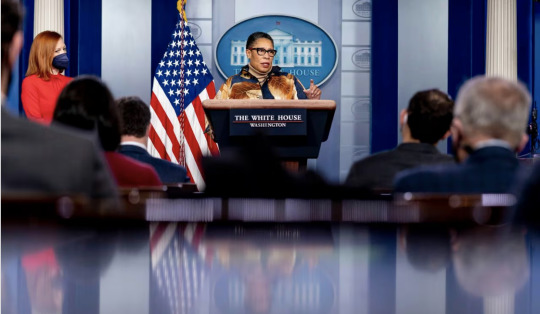
Ensuring Equitable Educational Opportunity for Black Students To expand educational opportunity for the Black community in early childhood and beyond, the Biden-Harris Administration has:
Approved more than $136 billion in student loan debt cancellation for 3.7 million Americans through various actions and launched a new student loan repayment plan—the Saving on a Valuable Education (SAVE) plan—to help many students and families cut in half their total lifetime payments per dollar borrowed.
Championed the largest increase to Pell Grants in the last decade—a combined increase of $900 to the maximum award over the past two years, affecting the over 60% of Black undergraduates who rely on Pell grants.
Fixed the Public Service Loan Forgiveness (PSLF) program, so all qualified borrowers get the debt relief to which they are entitled. More than 790,000 public servants have received more than $56 billion in loan forgiveness since October 2021. Prior to these fixes, only 7,000 people had ever received forgiveness through PSLF.
Delivered a historic investment of over $7 billion to support HBCUs.
Reestablished the White House Initiative on Advancing Educational Equity, Excellence, and Economic Opportunity for Historically Black Colleges and Universities and the White House Initiative on Advancing Educational Equity, Excellence, and Economic Opportunity for Black Americans.
Through ARP, secured $130 billion—the largest investment in public education in history—to help students get back to school, recover academically in the wake of the COVID-19 pandemic, and address student mental health.
Secured a 30% increase in child care assistance funding last year. Black families comprise 38% of families benefiting from federal child care assistance. Additionally, the President secured an additional $1 billion for Head Start, a program where more than 28% of children and pregnant women who benefit identify as Black.
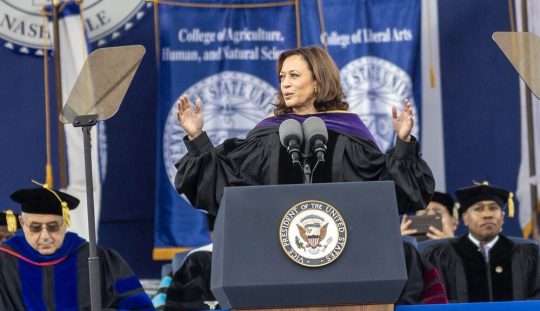
Improving Health Outcomes for Black Families and Communities To improve health outcomes for the Black community, the Biden-Harris Administration has:
Increased Black enrollment in health care coverage through the Affordable Care Act by 49%—or by around 400,000—from 2020 to 2022, helping more Black families gain health insurance than ever before.
Through IRA, locked in lower monthly premiums for health insurance, capped the cost of insulin at $35 per covered insulin product for Medicare beneficiaries, and helped further close the gap in access to medication by improving prescription drug coverage and lowering drug costs in Medicare.
Through ARP, expanded postpartum coverage from 60 days to 12 months in 43 states and Washington, D.C., covering 700,000 more women in the year after childbirth. Medicaid covers approximately 65% of births for Black mothers, and this investment is a critical step to address maternal health disparities.
Financed projects that will replace hundreds of thousands of lead pipes, helping protect against lead poisoning that disproportionately affects Black communities.
Provided 264 grants with $1 billion in Bipartisan Safer Communities Act funds to more than 40 states to increase the supply of school-based mental health professionals in communities with high rates of poverty.

Launched An Unprecedented Whole-Of-Government Equity Agenda to Ensure the Promise of America for All Communities, including Black Communities President Biden believes that advancing equity, civil rights, racial justice, and equal opportunity is the responsibility of the whole of our government, which will require sustained leadership and partnership with all communities. To make the promise of America real for every American, including for the Black Community, the President has:
Signed two Executive Orders directing the Federal Government to advance an ambitious whole-of-government equity agenda that matches the scale of the challenges we face as a country and the opportunities we have to build a more perfect union.
Nominated the first Black woman to serve on the Supreme Court and more Black women to federal circuit courts than every President combined.
Countered hateful attempts to rewrite history including: the signing of the Emmett Till Antilynching Act; establishing Juneteenth as a national holiday; and designating the Emmett Till and Mamie Till-Mobley National Monument in Mississippi and Illinois. The Department of the Interior has invested more than $295 million in infrastructure funding and historic preservation grants to protect and restore places significant to Black history.
Created the Justice40 Initiative, which is delivering 40% of the overall benefits of certain Federal investments in clean energy, affordable and sustainable housing, clean water, and other programs to disadvantaged communities that are marginalized by underinvestment and overburdened by pollution as part of the most ambitious climate, conservation, and environmental justice agenda in history.

Protecting the Sacred Right to Vote for Black Families and Communities Since their first days in office, President Biden and Vice President Harris have prioritized strengthening our democracy and protecting the sacred right to vote in free, fair, and secure elections. To do so, the President has:
Signed an Executive Order to leverage the resources of the Federal Government to provide nonpartisan information about the election process and increase access to voter registration. Agencies across the Federal Government are taking action to respond to the President’s call for an all-of-government effort to enhance the ability of all eligible Americans to participate in our democracy.
Repeatedly and forcefully called on Congress to pass essential legislation, including the John R. Lewis Voting Rights Advancement Act and the Freedom to Vote Act, including calling for an exception to the filibuster to pass voting rights legislation.
Increased funding for the Department of Justice’s Civil Rights Division, which has more than doubled the number of voting rights enforcement attorneys. The Justice Department also created the Election Threats Task Force to assess allegations and reports of threats against election workers, and investigate and prosecute these matters where appropriate.
Signed into law the bipartisan Electoral Reform Count Act, which establishes clear guidelines for our system of certifying and counting electoral votes for President and Vice President, to preserve the will of the people and to protect against the type of attempts to overturn our elections that led to the January 6 insurrection.
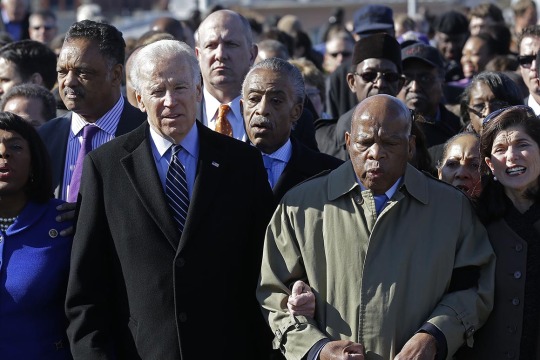
Addressing the Crisis of Gun Violence in Black Communities Gun violence has become the leading cause of death for all youth and Black men in America, as well as the second leading cause of death for Black women. To address this national crisis, the President has:
Launched the first-ever White House Office of Gun Violence Prevention, and taken more executive action on gun violence than any President in history, including investments in violence reduction strategies that address the root causes of gun violence and address emerging threats like ghost guns. In 2022, the Administration’s investments in evidence-based, lifesaving programs combined with aggressive action to stop the flow of illegal guns and hold shooters accountable yielded a 12.4% reduction in homicides across the United States.
Signed into the law the Bipartisan Safer Communities Act, the most significant gun violence reduction legislation enacted in nearly 30 years, including investments in violence reduction strategies and historic policy changes to enhance background checks for individuals under age 21, narrow the dating partner loophole in the gun background check system, and provide law enforcement with tools to crack down on gun trafficking.
Secured the first-ever dedicated federal funding stream for community violence intervention programs, which have been shown to reduce violence by as much as 60%. These programs are effective because they leverage trusted messengers who work directly with individuals most likely to commit gun violence, intervene in conflicts, and connect people to social, health and wellness, and economic services to reduce the likelihood of violence as an answer to conflict.

Enhancing Public Trust and Strengthening Public Safety for Black Communities Our criminal justice system must protect the public and ensure fair and impartial justice for all. These are mutually reinforcing goals. To enhance equal justice and public safety for all communities, including the Black community, the President has:
Signed a historic Executive Order to put federal policing on the path to becoming the gold standard of effectiveness and accountability by requiring federal law enforcement agencies to ban chokeholds; restrict no-knock warrants; mandate the use of body-worn cameras; implement stronger use-of-force policies; provide de-escalation training; submit use-of-force data; submit officer misconduct records into a new national accountability database; and restrict the sale or transfer of military equipment to local law enforcement agencies, among other things.
Taken steps to right the wrongs stemming from our Nation’s failed approach to marijuana by directing the Departments of Health and Human Services and Justice to expeditiously review how marijuana is scheduled under federal law and in October 2022 issued categorical pardons of prior federal and D.C. offenses of simple possession of marijuana and in December 2023 pardoned additional offenses of simple possession and use of marijuana under federal and D.C. law. While white, Black, and brown people use marijuana at similar rates, Black and brown people have been arrested, prosecuted, and convicted at disproportionately higher rates.
Announced over 100 concrete policy actions as part of a White House evidence-informed, multi-year Alternatives, Rehabilitation, and Reentry Strategic Plan to safely reduce unnecessary criminal justice system interactions so police officers can focus on fighting crime; supporting rehabilitation during incarceration; and facilitating successful reentry.
FACT SHEET
#Joe Biden#Thanks Biden#Black History Month#black americans#african american#kamala harris#politics#US Politics#Economy#student loan debt#marijuana#criminal justice#gun violence#voting rights#from the White House#long post#because a lot has happened
77 notes
·
View notes
Text
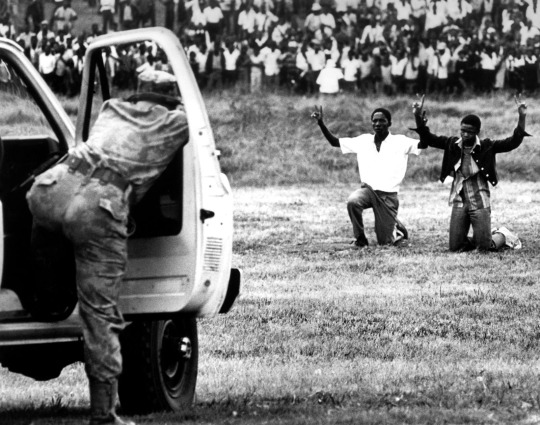
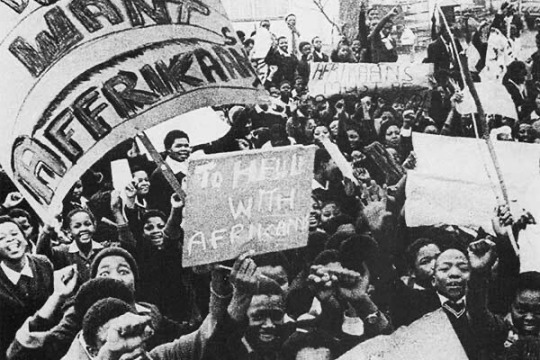
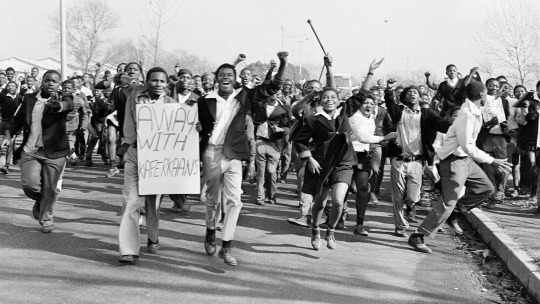
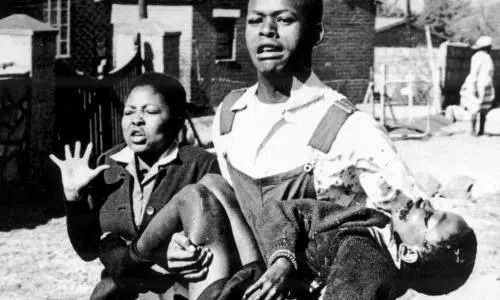
In 1976 the township of Soweto situated in the city of Johannesburg saw a massive uprising whereby thousands of South African students took to the streets to protest against a language rule introduced by the white-minority rule. During the devastating uprising hundreds were killed in the police response but the events would profoundly change the country's social and political landscape.
The the very touching picture of a lifeless 13 year old boy named Hector Pieterson, who had just been shot by the police during the protests was a massive game changer for how the people felt towards apartheid world wide.
The 1976 uprising came after the white dominated South African government decided that black schools could only teach in a language called Afrikaans and English in a 50-50 mix of the languages of instruction within schools. This news had not gone down well with black people as Afrikaans was the language used by the government and many white people within South Africa, for this reason Afrikaans was seen as the language of the oppressor by many black South Africans. What made the new law of even worse was the fact that, while black schools had to provide instruction in both Afrikaans and English as languages, white South African students learned other subjects in their home language.
On June 16th at 7AM thousands of schoolchildren started to protest against the new law, singing songs and waving signs. At first police used gas to try and calm things down, but then started firing guns. The children protesting threw stones back at the police and by then protest had turned into a riot which lasted three days as adults joined in to show their frustration against the language rule change as well as the apartheid movement. By the end of a violent few days of protests, the South African government claimed that 95 people, some of them children, had been killed but in actual fact more than 700 people died during the uprising.
The bloody uprising and the way it was dealt with had brought the massive racial problems in South Africa to the world's attention. Some countries introduced sanctions against South Africa.
•••
En 1976, el municipio de Soweto, situado en la ciudad de Johannesburgo, fue testigo de una rebelión masiva en la cual miles de estudiantes sudafricanos salieron a las calles para protestar contra una regla lingüística introducida por la minoría blanca. Durante la devastadora rebelión cientos de personas murieron a causa de la respuesta policial, pero los acontecimientos cambiarían profundamente el panorama social y político del país.
Una muy conmovedora imagen de un niño sin vida llamado Hector Pieterson, de trece años de edad y quien acababa de recibir un disparo por parte de la policía durante las protestas, fue lo que causó un enorme cambio en la forma en la que se sentía el resto del mundo hacia la segregación racial.
La rebelión de 1976 se produjo después de que el gobierno sudafricano dominado por las personas blancas decidiera que las escuelas negras sólo podían enseñar en un idioma llamado afrikáans e inglés. Esta noticia no fue bien recibida por las personas negras, ya que el afrikáans era el idioma utilizado por el gobierno y muchas personas blancas en Sudáfrica. Por esta razón muchos sudafricanos negros veían el afrikáans como el idioma del opresor. Lo que hizo que la nueva ley fuera aún peor fue el hecho de que, mientras las escuelas negras tenían que impartir lecciones tanto en afrikáans como en inglés, los estudiantes blancos sudafricanos aprendían otras materias en su lengua materna.
El 16 de junio a las siete de la mañana, miles de estudiantes comenzaron a protestar contra la nueva ley, cantando canciones y agitando carteles. Al principio, la policía utilizó gas para intentar calmar la situación, pero luego empezó a disparar. Los niños que protestaban arrojaron piedras a la policía y para entonces la protesta se había convertido en un motín que duró tres días a medida que los adultos se unían para mostrar su frustración contra el cambio de la norma lingüística y la segregación racial. Después de unos días de protestas violentas, el gobierno sudafricano afirmó que 95 personas, algunos de ellos niños, habían sido asesinadas, pero en realidad más de 700 personas murieron durante la rebelión.
La rebelión sangrienta y la forma en la que fue tratada, hizo que el mundo le prestara atención a los enormes problemas raciales en Sudáfrica. Algunos países introdujeron sanciones contra Sudáfrica.
#blacklivesmatter#blacklivesalwaysmatter#english#spanish#blackhistory#history#blackhistorymonth#africanhistory365#africanhistory#soweto#knowyourhistory#historyfacts#blackhistoryyear#black history is world history#black history matters#black history is everybody's history#historia#african history#black history month#south africa#apartheid#students#education#africa#lasvidasnegrasimportan#español#Johana#revolution#share#read
33 notes
·
View notes
Text

Gordon Parks: Stokely Carmichael and Black Power, Edited by Lisa Volpe, Steidl Verlag, Göttingen, 2022 [© Gordon Parks / The Gordon Parks Foundation, Pleasantville, NY]








#graphic design#art#photography#catalogue#catalog#cover#stokely carmichael#kwame ture#gordon parks#lisa volpe#peter w. kunhardt jr.#student nonviolent coordinating committee#sncc#a aprp#all african people's revolutionary party#steidl#2020s
18 notes
·
View notes
Text
learning abt how deeply woven the Quran and muslims are in the fabric of american history….
#a conservative 30% of enslaved africans were muslim????? nowhere was i taught that in school#jefferson had his own copy of the quran he purchased as a student and referred to often for comparative analysis???#explicitly wrote in jews muslims and hindus to have religious freedom in the virginia statute???#history is soooo fascinating fr like that man had people he considered his property and yet . he said all that#seedpost
9 notes
·
View notes
Text
Sitting white americans down and holding their hands and giving them a cup of tea and gently explaining that Not All Black People Are American
#a take i saw earlier today lol#and that ive seena. few times in my life#its just. so weird.#do i know their races? no#but irl ive ONLY seen white ppl say that#its really really weird.#god i forget what i took but i took some sort of online test the other day with a demographic queationnaire for research purposes#and the Black options were “african-american” and “Black african”#HUH????#i had major beef with that one tho the ethnicity options were. weird.#eg it had like “northern Indigenous (Inuit)”#like ok. um.#wh... why not the others?? what about the yupik? or aleut?#like even if its America centric that option Didnt Make Sense#only reason i can possibly understand is that it was made by undergrad students or something who didnt get their prof to look at the list#like i cannot emphasise how weird “northern Indigenous (Inuit)” is
7 notes
·
View notes
Text
i feel like all i ever do is complain about my job like there are some parts i really love about teaching but then some days i want to run and nosedive out the window
#anyways i’m going to complain in the tags so it’s easy to ignore#like#ugh!!!!#my district does not mandate any special curriculum like as long as you’re teaching to the standards it’s fine#my school paid for a textbook that is bad. it’s been bad. I have been complaining about the textbook for 6 years now and no one listens cuz#they don’t care about history and also my admin don’t know how to teach so they think a book with scripted lines and imbedded tests are good#cuz they think it’s less work and it kinda is but the book is BAD not up to date doesn’t give nuance#there’s a chapter on how thanksgiving was a good day and it was how the pilgrims said thanks and has nothing about the murder or#brutalization of the indigenous people. there’s like a chapter on slavery that’s like ‘Africans came on boats to help work the fields 😁’#and so i follow the timeline of the textbook i take excerpts from it and then I supplement the rest make it into a power point#give the students think questions for each section it’s rigorous but not too hard cuz most of my kids are below 8th reading comprehension#levels and ny admin come in and and are like why aren’t you using the book I’ve told you why I don’t but here is what I’m doing#well the kids aren’t discussing. today isn’t a discussion day today is a lecture day wed is discussion day after I give the facts#well they need to discuss everyday. well they don’t cuz they can’t discuss what they haven’t read yet. if they don’t know about the war how#can they discuss the war? like it’s a multi step process#but they want today im not doing my job cuz im not doing it how they went to one seminar and that presenter said is a new way to tech#never mind I have students that come back to me from high school like wow I miss your class I learned so much etc etc#like my kids learn everyday. the work is engaging every single day#LEAVE ME ALONE AND LET ME TEACH!! ive been doing this for almost 10 years i fucking got this#raaaaaaahhhh aaaahhhh gaaaaah kill stab bite murder murder violence!!!
6 notes
·
View notes
Text

Hi! My name is Stephanie Byron-Ene, and I am the writer and director of Omenala (Oh-May-Nah-lah), which translates to "As it is in the land." 🇳🇬 First, I’ll like to give you a little bit of my backstory. I’m Nigerian, from the Igbo tribe, and grew up in Lagos State before coming to the U.S. to study film. My passion for filmmaking started early. At just 10 years old, I would join my father on Nollywood sets at 4 a.m.— often just to hold the actor’s purse — but those experiences deeply shaped my love for storytelling. 🎬👜 I’m so excited to share this story and would love for you to be part of the journey! 🥰
#crowdfunding#short film#filmmaking#igbo culture#african culture#lagos nigeria#nigerian film#nollywood#directing#filmmaker#lagos state#student film#adobe#graphic design#screenwriting
7 notes
·
View notes
Text
Today, in honor of Black History Month, we remember the Orangeburg Massacre, which occurred on February 8, 1968 in South Carolina, when highway patrolmen opened fire on black student protesters from South Carolina State, who were trying to integrate a bowling alley. They killed 3 African American students and wounded 33. They were the first student demonstrators killed by the police in the 1960s.

#working class#labor history#orangeburg#massacre#racism#jim crow#african american#civil rights#police#police murder#police brutality#students#protest#black history#black history month#161#1312#all cops are bastards#all cops are bad#acab1312#acab#ftp#fuck the police#fuck the cops#anti police#anti cop#police state#class war#cops#cop
24 notes
·
View notes
Note
So are we emailing Kamala only about Palestine and are the atrocities still happening in Ukraine already old news?
And dont even get me started about current affairs in Bangladesh and several African countries.
bruh this is such a weird message you’re like this tweet

like are you trying to score vindictive moral brownie points or smthn. These are also things people should research and care abt, of course. The reason advocating for Palestine is so pressing to rally around is because we, unlike with Ukraine!!!, are actively funding, arming, and participating in its current destruction and in the killing of thousands and THOUSANDS OF PEOPLE
“Don’t even get me started…”. Bro what are you fucking doing on my tumblr blog mad at me abt this shit. You sound like a stern parent. Go make some noise in the president’s inbox if you actually care about these issues. Do you think I’m fucking Taylor Swift??? It’s a miracle the post I made even gained traction lmfao that was luck of the draw + thanks to a few mutuals I have that have wider audiences.
This reeks of “person who gets told what to do by social media” lmfao like I am literally not stopping you. You don’t need a green light from a random tumblr user to advocate for things you care about. Don’t make me god in your head and then get mad at me when I don’t make up commandments for you??
#star’s asks#I’m sorry I’m not a stand in for research and activism u actually won’t reach divinity by reading a post made by tumblr user starredforlife#y’all need to be grown ups and he capable of caring about these things without someone steering you in that direction#in case you were unaware: there are student protests in bangledesh leading to mass police violence/brutality in response#and these ‘miscellaneous African countries’ (c’mon. like c’mon) are most likely Sudan (civil war) and the Congo (exploitation)#I am trusting you guys with the BREADTH OF THE INTERNET to go research these things and advocate for them too. of course.#but dont fucking wait for me#star’s anons
9 notes
·
View notes